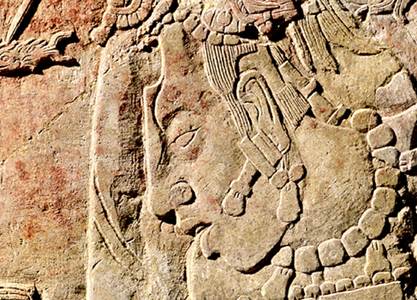prev - home - loop
| In many Maya monuments, rulers are shown receiving their signs of office from dead ancestors, most often parents. Neither of Ahkal Mo' Nahb's parents ever ruled Palenque. Additionally, it is possible that he acceded in the middle of a political crisis: a possible defeat of Palenque at the hands of Toniná seems to have left Palenque literally headless. He may have been confronted with the problem of acceding without the sanction of an authority high enough as to lend legitimacy to his claim to the throne. In the absence of such a high authority, he may have had to resort to ancient religious history for a precedent that would justify his unorthodox accession. That he should share the monument commemorating his taking of office with no less than six other persons suggests that complex negotiations with different factions or high-ranking families may have had to take place in order to make it possible at all. But what is truly remarkable here is the fact that, for his legitimacy to be acknowledged, he was forced to symbolically relinquish the position of highest authority in his own accession monument to a person who was neither a ruler nor a dead ancestor. |
